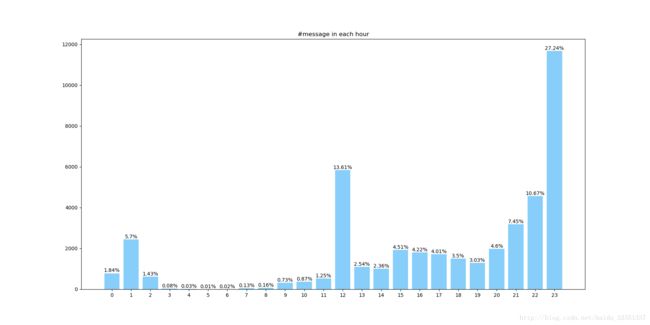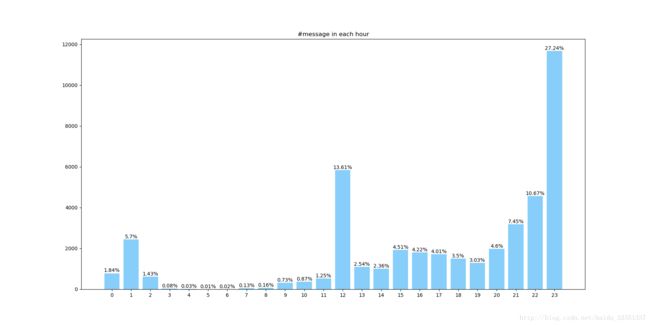Python-QQ聊天记录分析-jieba+wordcloud
QQ聊天记录简单分析
0. Description
从QQ导出了和好友从2016-08-25到2017-11-18的消息记录,85874行,也算不少。于是就有了大致分析、可视化一下。步骤大致如下:
- 消息记录文件预处理
- 使用jieba分词
- 使用wordcloud生成词云
- 生成简单图表
结果大致如下:
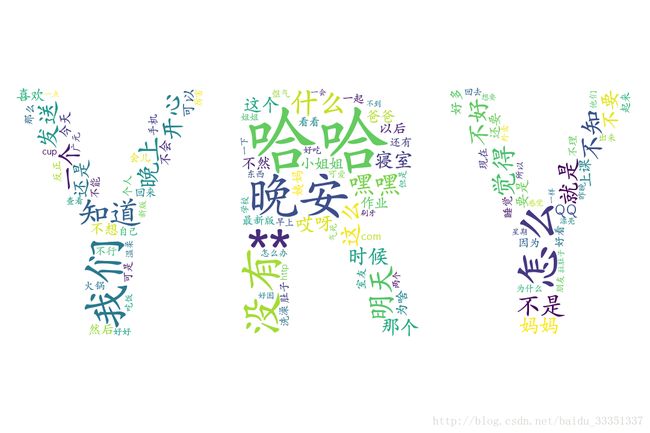 |
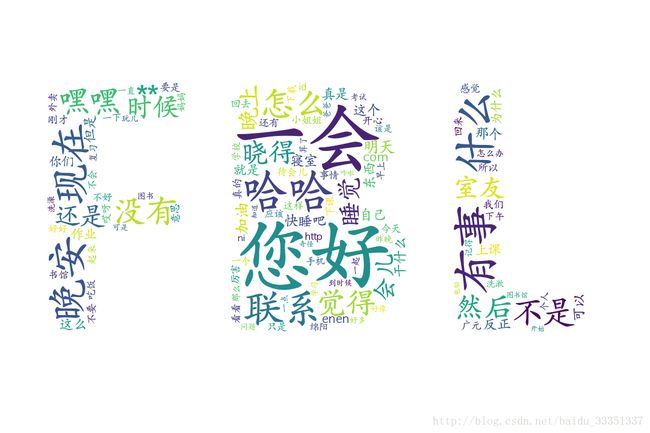 |
1. Preprocessing
导出的文件大概格式如下:(已去掉多余空行)
2016-08-26 11:02:56 PM 少平
这……
2016-08-26 11:03:02 PM 少平
这bug都被你发现了
2016-08-26 11:03:04 PM C
反驳呀
2016-08-26 11:03:25 PM C
too young
2016-08-26 11:04:43 PM C
我去刷鞋子
2016-08-26 11:04:58 PM 少平
嗯嗯
好的
Observation&Notice:
- 每条消息上都有对应发送时间和发送者
- 列表内容
- 一条消息内可能有换行
由此,
- 可以依照发送者对消息分开为聊天双方。
- 将各自的内容分别放在文件中,便于后续分词和制作词云。
- 将所有聊天时间抽取出来,可以对聊天时段进行分析和图表绘制。
Arguments:
infile⇒ 原始导出消息记录文件
outfile1⇒ 对话一方的消息记录文件名
outfile2⇒ 对话另一方的消息记录文件名
Outputs:
预处理后的分别储存的消息记录文件(其中只包含一方聊天内容)以及一个消息时间文件
# -*- coding: utf-8 -*-
""" Spilt the original file into different types in good form. """
import re
import codecs
IN_FILE = './data.txt'
OUT_CONTENT_FILE_1 = './her_words.txt'
OUT_CONTENT_FILE_2 = './my_words.txt'
OUT_TIME_FILE = './time.txt'
UTF8='utf-8'
MY_NAME_PATTERN = u'少平'
TIME_PATTERN = r'\d{4,4}-\d\d-\d\d \d{1,2}:\d\d:\d\d [AP]M'
TEST_TPYE_LINE = u'2017-10-14 1:13:49 AM 少平'
def split(infile, outfile1, outfile2):
"""Spilt the original file into different types in good form."""
out_content_file_1 = codecs.open(outfile1, 'a', encoding=UTF8)
out_content_file_2 = codecs.open(outfile2, 'a', encoding=UTF8)
out_time_file = codecs.open(OUT_TIME_FILE, 'a', encoding=UTF8)
try:
with codecs.open(infile, 'r', encoding=UTF8) as infile:
line = infile.readline().strip()
while line:
if re.search(TIME_PATTERN, line) is not None: # type lines
time = re.search(TIME_PATTERN, line).group()
out_time_file.write(u'{}\n'.format(time))
content_line = infile.readline()
flag = 0 # stands for my words
if re.search(MY_NAME_PATTERN, line):
flag = 0
else:
flag = 1
while content_line and re.search(TIME_PATTERN, content_line) is None:
if flag == 1:
out_content_file_1.write(content_line)
else:
out_content_file_2.write(content_line)
content_line = infile.readline()
line = content_line
except OSError:
print 'error occured here.'
out_time_file.close()
out_content_file_1.close()
out_content_file_2.close()
if __name__ == '__main__':
split(IN_FILE, OUT_CONTENT_FILE_1, OUT_CONTENT_FILE_2)
2. Get word segmentations using jieba
使用jieba分词对聊天记录进行分词。
import codecs
import jieba
IN_FILE_NAME = ('./her_words.txt', './my_words.txt')
OUT_FILE_NAME = ('./her_words_out.txt', './my_words_out.txt')
def split(in_files, out_files):
"""Cut the lines into segmentations and save to files"""
for in_file, out_file in zip(in_files, out_files):
outf = codecs.open(out_file, 'a', encoding=UTF8)
with codecs.open(in_file, 'r', encoding=UTF8) as inf:
line = inf.readline()
while line:
line = line.strip()
seg_list = jieba.cut(line, cut_all=True, HMM=True)
for word in seg_list:
outf.write(word+'\n')
line = inf.readline()
outf.close()
if __name__ == '__main__':
split(IN_FILE_NAME, OUT_FILE_NAME)3. Make wordclouds using wordcloud
抽取分词结果中出现频率最高的120个词,使用wordcloud进行词云生成。并且,屏蔽部分词语(STOP_WORDS),替换部分词语(ALTER_WORDS)。
STOP_WORDS = [u'图片', u'表情', u'窗口', u'抖动', u'我要', u'小姐', u'哈哈哈', u'哈哈哈哈', u'啊啊啊', u'嘿嘿嘿']
ALTER_WORDS = {u'被替换词1':u'替换词1',u'被替换词2':u'替换词2'}Arguments:
in_files⇒ 分词产生的结果文件
out_files⇒ 保存词云的目标地址
shape_files⇒ 词云形状的图片文件
Output:
对话双方各自内容的词云
import jieba.analyse
import numpy as np
from PIL import Image
from wordcloud import WordCloud
OUT_FILE_NAME = ('./her_words_out.txt', './my_words_out.txt')
OUT_IMG_NAME = ('./her_wordcloud.png', './my_wordcloud.png')
SHAPE_IMG_NAME = ('./YRY.png', './FBL.png')
def make_wordcould(in_files, out_files, shape_files):
"""make wordcould"""
for in_file, out_file, shape_file in zip(in_files, out_files, shape_files):
shape = np.array(Image.open(shape_file))
content = codecs.open(in_file, 'r', encoding=UTF8).read()
tags = jieba.analyse.extract_tags(content, topK=120, withWeight=True)
text = {}
for word, freq in tags:
if word not in STOP_WORDS:
if word in ALTER_WORDS:
word = ALTER_WORDS[word]
text[word] = freq
wordcloud = WordCloud(background_color='white', font_path='./font.ttf', mask=shape, width=1080, height=720).generate_from_frequencies(text)
wordcloud.to_file(out_file)
if __name__ == '__main__':
make_wordcould(OUT_FILE_NAME, OUT_IMG_NAME, SHAPE_IMG_NAME)以下是指定的词云形状(对应WordCloud()中的mask参数):
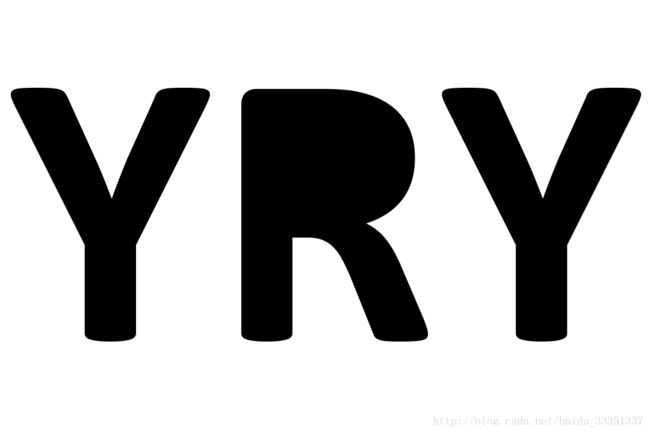 |
 |
以下是生成的词云:
 |
 |
4. Generate a simple bar plot about time
根据预处理中产生的时间文件制作简单柱状图。
#-*- coding: utf-8 -*-
""" make a simple bar plot """
import codecs
import matplotlib.pyplot as plt
FILE = 'time.txt'
def make_bar_plot(file_name):
"""make a simple bar plot"""
time_list = {}
message_cnt = 1
with codecs.open(file_name, 'r', encoding='utf-8') as infile:
line = infile.readline()
while line:
line = line.strip()
time_in_12, apm = line.split()[1:2]
time_in_24 = time_format(time_in_12, apm)
if time_in_24 in time_list:
time_list[time_in_24] = time_list[time_in_24] + 1
else:
time_list[time_in_24] = 1
line = infile.readline()
message_cnt = message_cnt + 1
plt.figure(figsize=(18, 9))
plt.bar(time_list.keys(), time_list.values(), width=.8,
facecolor='lightskyblue', edgecolor='white')
plt.xticks(range(len(time_list)), time_list.keys())
for x_axies in time_list:
y_axies = time_list[x_axies]
label = '{}%'.format(round(y_axies*1.0/message_cnt*100, 2))
plt.text(x_axies, y_axies+0.05, label, ha='center', va='bottom')
plt.title('#message in each hour')
plt.savefig('time.png')
def time_format(time_in_12, apm):
"""docstring"""
hour = time_in_12.split(':')[0]
hour = int(hour)
if apm == 'PM':
hour = hour + 12
time_in_24 = hour % 24
return time_in_24
if __name__ == '__main__':
make_bar_plot(FILE)
